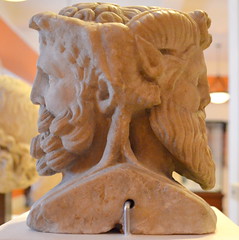Happy New Year, Language Nerd!
As I look at my new 2013 calendar, I’m wondering, where do these month names come from and what do they mean? Especially, is the “octo” in “October” the same as “octopus,” meaning 8? If so why is it the 10th month?
Thanks!
Mary M.
***
Happy New Year to you too, Mary! And good eye – it is indeed the same “octo.” Let’s do the months in lumps, starting from the end, because that direction goes from simplest explanation to most complex.
September, October, November, and December mean “seventh,” “eighth,” “ninth,” and “tenth,” respectively. Why are they actually the ninth, tenth, eleventh, and twelfth months? Because when this calendar was set up in Ye Olde Rome, the New Year was in March, and everybody was in order. We’ll come back to the placing of New Year below.
This means that these months are just numbers (boring), and not in the right place anyway (silly), so if you were powerful and extremely cocky and ready to rename some months, these would be a good place to start. Which brings us to…
July and August, formerly known as Quintilis (“fifth”) and Sextilis (“sixth”). When Augustus Caesar did a little calendar-tweaking during his reign, he decided to rename that goofy “fifth-actually-seventh month” after the venerable, heroic, much-beloved Julius. And if the populace rose up to declare that he too would be held in their hearts as a revered leader forevermore and thus clearly needed a month himself, well, who was he to deny them? I’m just surprised he stopped there and didn’t clear up the off-numbered month problem entirely.
May and June. Done with the numbers! These two have competing stories for just what they mean. The usual tale is that they are named for gods, Maia (an earth goddess) and Juno (queen of the gods). Ovid, however, disagrees, saying that they celebrate maiores (“elders”) and iuniores (“juniors,” young people), respectively. Then again, Ovid got kicked out of Rome for adding too many sexy bits to the myths like a Roman Dan Brown, so, y’know, grain of salt.*
April is, um, well, it’s, ah, no one knows. Some say the name comes from the Greek goddess Aphrodite, some say from her Roman counterpart Venus, some say from the Latin aperire, “to open,” as in buds a-bloomin. Take your pick, or make up an etymology yourself! No one can stop you!
January, February, and March. Finally, we come to the real troublemakers. In the original Roman calendar, the year started in March and ended in December, and in between was “crappy winter time,” nameless and numberless, which people just survived through day-to-day to get to the new spring. Sometime before 450 BC, this time was divided up into January, February, and Intercalaris. That’s right, Intercalaris, the lost thirteenth month! Intercalaris came between February and March, and it could have different numbers of days. The political head honcho was supposed to add it in whenever necessary to make the months and seasons match up. However (and prepare to be amazed), the leader tended to use it for political purposes, like keeping people he liked in office longer, instead of adhering strictly to the original goal. When Julius Caesar came through and made his calendar adjustments, he got rid of this month and made keeping seasons straight the problem of February instead – hence the occasional 29th day. Julius also solidified January 1 as New Year’s Day (it had been moved around previously, to match when new consuls came to office). Why? Well, he apparently liked the symbolism. January was named for Janus, the god with a face on either side of his head, and the whole looking-forward-looking-back is very thematically appropriate for new beginnings. He had an eye for poetry, that Julius.
Was this the end of New Year’s shenanigans? Indeed it was not! Early popes moved the day back to March, to March 25 in fact, to begin the year at the Annunciation (the day the Holy Spirit showed up to tell Mary that her upcoming baby was kind of a big deal). Pope Gregory XIII, who in 1582 fixed the calendar up good and proper, moved the day back to January 1. This is also an important day in Christianity because, being a week after Jesus’ birth, it’s considered to be the day the poor baby got snipped. If you feel the urge to run around today hugging everyone and saying “Happy Circumcision Day!” you will be entirely in keeping with Catholic tradition, for what it’s worth.
Oh, and I almost forgot – February comes from Februa, a special Roman feast of purification that took place then, and March is named for Mars, the god of war.
Have a great and nerdy 2013!
Yours,
The Language Nerd
*Alright, alright, so no one really knows how Ovid managed to get himself exiled and there’s about a bjillion competing stories. This one’s the funniest, though.
Send YOUR etymology of April (and any language questions) to The Language Nerd at asktheleagueofnerds@gmail.com.
Or: Twitter @AskTheLeague / facebook.com/asktheleagueofnerds
References!
This guy really loves calendars.
Here’s a place where you can read classy Ovid poems about the months.
And, as usual, I love me some etymonline.
A NOTE: As mentioned in my last post, the beautiful Trinity Episcopal Church took terrible damage from the Christmas Tornado. As soon as they have a place to donate set up, that information will be here, and please consider helping them out.
Brought to you by The League of Nerds
